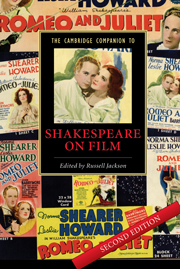Book contents
- Frontmatter
- Introduction: Shakespeare, films and the marketplace
- Part I Adaptation and its Contexts
- Part II Genres and Plays
- Part III Directors
- 9 The Shakespeare films of Laurence Olivier
- 10 Orson Welles and filmed Shakespeare
- 11 Grigori Kozintsev’s Hamlet and King Lear
- 12 Franco Zeffirelli and Shakespeare
- 13 Flamboyant realist: Kenneth Branagh
- Part IV Critical Issues
- Further Reading
- Filmography
- Index
- Series List
13 - Flamboyant realist: Kenneth Branagh
from Part III - Directors
Published online by Cambridge University Press: 28 July 2007
- Frontmatter
- Introduction: Shakespeare, films and the marketplace
- Part I Adaptation and its Contexts
- Part II Genres and Plays
- Part III Directors
- 9 The Shakespeare films of Laurence Olivier
- 10 Orson Welles and filmed Shakespeare
- 11 Grigori Kozintsev’s Hamlet and King Lear
- 12 Franco Zeffirelli and Shakespeare
- 13 Flamboyant realist: Kenneth Branagh
- Part IV Critical Issues
- Further Reading
- Filmography
- Index
- Series List
Summary
The release of Kenneth Branagh’s film of Henry V in 1989 sparked a revival of creative and commercial interest in Shakespeare as a source for films, which had been dormant since the box-office failure of Roman Polanski’s Macbeth in 1971. The surprising critical and financial success of Branagh’s Henry V has proved to be as influential in the history of Shakespeare on film as was the equally unanticipated success almost fifty years earlier of Laurence Olivier’s film of the play released in 1944. Olivier’s Henry V led to a steady stream of international Shakespeare films over the next two decades by such directors as Orson Welles, Akira Kurosawa, Grigori Kozintsev, Franco Zeffirelli and Peter Brook. Branagh’s 1989 film helped to create the most intense explosion of English language Shakespeare films in the century. The 1990s saw the release of ten major Shakespeare films as well as several interesting Shakespearean offshoots, including Branagh’s own In the Bleak Midwinter. Branagh has now surpassed Olivier, Welles and Zeffirelli, to become the only director to have produced five Shakespeare films, though an examination of his films will reveal that Branagh has moulded his own cinematic style from elements present in the work of his distinguished predecessors. Popular film culture, represented at one extreme by James Cagney and at the other by Orson Welles, lies deep in the soul of Branagh’s creative sensibility. Branagh watchers have long recognised that he generates much of his artistic power - as an actor and director - from his unique stance as an outsider to mainstream English theatrical culture.
- Type
- Chapter
- Information
- The Cambridge Companion to Shakespeare on Film , pp. 226 - 242Publisher: Cambridge University PressPrint publication year: 2007
- 1
- Cited by

